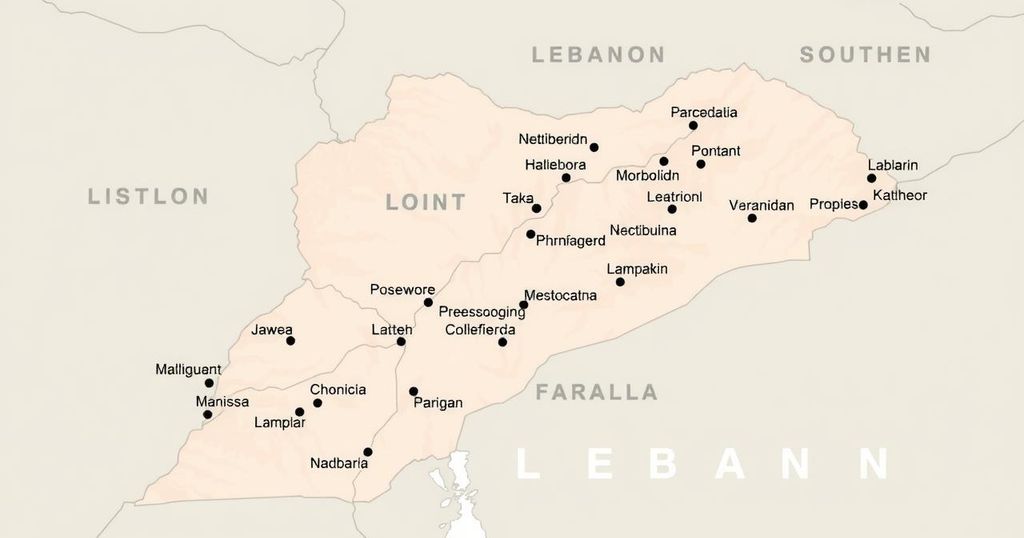Global news
ALMA CENTER, AM, ARMY, ASIA, BEIRUT, CEASEFIRE, CONFLICT, EUROPE, FOREIGN MINISTRY, FRANCE, HARET HREIK, HEZBOLLAH, HUMANITARIAN CRISIS, JEAN - YVES LE DRIAN, LE, LEBANON, LOYALTY TO THE RESISTANCE, LOYALTY TO THE RESISTANCE BLOC, NORTH AMERICA, OF ARAB AND INTERNATIONAL RELATIONS, RESISTANCE, RESISTANCE BLOC, SALAM, TERRORISM, UN, UNIFIL, UNITED NATIONS INTERIM FORCE, UNITED NATIONS INTERIM FORCE IN LEBANON, UNITED STATES, WAR CRIMES, ZOE LEVORNIK
Fatima Khan
0 Comments
Lebanon Supports UNIFIL Renewal as Israel Calls for Its Termination
Lebanese Prime Minister Salam reaffirms commitment to UNIFIL amid rising tensions, while Israel seeks to end its mandate, citing failures to curb Hezbollah’s military build-up. Hezbollah’s activities and recent clashes with locals raise concerns about UNIFIL’s effectiveness and presence in southern Lebanon, emphasizing the ongoing debate surrounding its role.
Tensions in southern Lebanon are rising as Lebanese Prime Minister Nawaf Abdallah Salim Salam emphasized Lebanon’s commitment to the renewal of the United Nations Interim Force in Lebanon (UNIFIL) mandate. Salam stated, “Lebanon is eager to renew the UNIFIL mandate,” pointing out that repeated assaults on UNIFIL personnel jeopardize security and stability in the region. He urged authorities to end these attacks and bring perpetrators to justice, underscoring the need for maintaining peace along the southern border.
The Lebanese Foreign Ministry condemned a recent incident involving an attack on a UNIFIL soldier. They stressed the significance of safeguarding UN peacekeeping forces and holding those responsible accountable, both by Lebanese and international law. This incident occurred after rising tensions emerged from a clash between locals and a UNIFIL patrol, which reportedly ventured into an area without the Lebanese army’s escort, highlighting the friction between certain southern villages and international peacekeeping bodies.
On June 11, notable discussions unfolded between the head of the Loyalty to the Resistance bloc, MP Hajj Mohammad Raad, and French Presidential Envoy Jean-Yves Le Drian, alongside French Ambassador to Lebanon Hervé Magro. Focused on political dynamics and Israeli aggression, the discussions also addressed the build-up of UNIFIL forces. Le Drian reiterated France’s commitment to organizing a conference for the reconstruction of southern Lebanon, as well as the renewal of the UNIFIL mission.
Contrasting perspectives emerged from Israel, where experts like Zoe Levornik and Sarit Zehavi from the Alma Center contend that since the conflict triggered by the Second Lebanon War in 2006 under Resolution 1701, UNIFIL has failed its mission. They suggest that Israel and the United States should terminate UNIFIL operations, citing the force’s inability to thwart Hezbollah’s military enhancements in the region.
These analysts argue that UNIFIL has allowed Hezbollah to amass significant military capabilities without interference. The discovery by the IDF of weapons and other military materials during recent conflicts raised concerns about Hezbollah’s preparedness for potential attacks. The report pointed out that this level of military readiness represents a grave threat to northern Israel.
Furthermore, the authors assert that Hezbollah has been able to construct tunnel networks near UNIFIL positions, calling into question whether the peacekeepers were unaware of these activities. Criticism extends to UNIFIL’s actions during the war, where it allegedly impeded Israeli military operations and refrained from abandoning its positions.
Since the ceasefire on November 27, 2024, no significant changes in UNIFIL’s ability to operate effectively against Hezbollah’s resurgence have been observed, despite the organization touting its efforts in rehabilitation and security. Multiple reports indicate that unaccompanied UNIFIL personnel have faced hostility from local communities, which further complicates their presence in the area.
In light of criticisms regarding its effectiveness, UNIFIL has maintained that its mission aligns with monitoring, humanitarian support, and assistance. However, this stance raises further questions about the organization’s contributions along the Israel-Lebanon border. Critics argue that if humanitarian aid is the focus, specialized organizations might be more suited for that purpose than peacekeeping forces.
Ultimately, the ongoing debate centers on whether the problems stem from UNIFIL’s mandate or its commitment to executing its primary roles. Many believe that even a renewed mandate would not yield the necessary changes to make the UNIFIL presence in southern Lebanon more impactful in ensuring security for both Israel and Lebanon. Calls for reform within the organization persist, but a lack of decisive action has led many to question UNIFIL’s role in the region.
More updates on this situation are available on Geopolitical Gleanings and AGCNEWS blogs.
The situation in southern Lebanon regarding the UNIFIL mandate is tense, with both Lebanese officials seeking its renewal and Israeli experts calling for its termination. As Lebanon expresses eagerness to maintain the UN peacekeeping presence due to security threats from Hezbollah, critics argue that UNIFIL has failed in its primary mission over the years. The contrasting perspectives highlight the complexities of the political and military dynamics in this volatile region.
Original Source: www.agcnews.eu




Post Comment